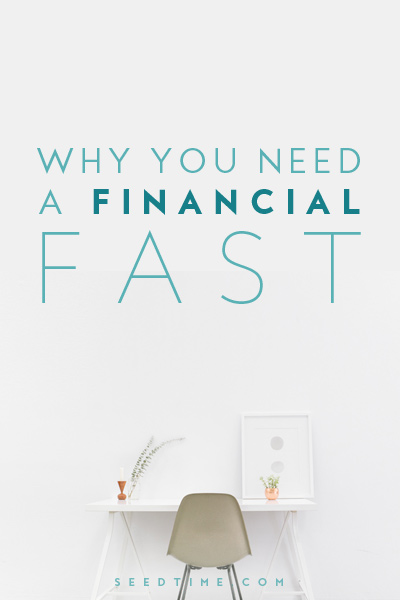 The Bible talks about fasting in both the New and Old Testaments.
The Bible talks about fasting in both the New and Old Testaments.
We read about Nehemiah fasting and praying for the children of Israel because they were in a time of trouble.
Daniel fasted and prayed for three weeks drawing nearer to God.
David fasted and prayed in a time of personal repentance.
Paul and Barnabas fasted and prayed before presenting leaders in the church.
There’s a close relationship between fasting and praying because fasting is a time for you to draw nearer to God. Spending time with God in prayer allows us to hear from him and discern things that may be troubling us.
Jesus spent 40 days in the desert fasting and praying before going into ministry because he knew that it was important.
How much more should we follow his example and fast the things that demand so much of our attention?
What’s a Financial Fast?
The Bible doesn’t limit fasting only to food and drinks. Anything that can be given up temporarily so that we can focus our full attention on God can be viewed as a fast.
Paul references how a husband and wife might abstain from being together for a time (yes, sexually) so they can devote themselves to prayer. So while the Bible doesn’t have a section devoted to a ‘Financial Fast,’ I think the principles can be applied to our finances.
There isn’t a lot of specific material to guide Christians in a financial fast, which is why I wanted to cover it here. Financial fasting isn’t meant to be easy or unintentional – it involves denying yourself so that you can refocus your reliance on Christ.
How to Fast with Your Finances
In holding to the principles of fasting that we see in the Bible, I think we can fast financially by practicing the following:
1. Identify necessities and luxuries.
If you already have a budget, this may be a little easier for you to do. Take some time to really focus your expenses on the things that you have to pay for – items like your house payment, term life insurance, food, etc. If you can go without it (be honest with yourself – eating out, iTunes music, going to the movies, etc) list it as a luxury and do your best to go without purchasing it during your financial fast.
The financial fast is not meant to keep you from enjoying the things you already own. It’s a practice in contentment and reliance on God to be our provider.
2. Resist the temptation to purchase luxuries.
This is the difficult part of the financial fast. It’s so easy to justify small (and sometimes large) purchases for convenience sake or because we feel that we deserve it. Yes, I’m talking about the afternoon trip to the vending machine, the morning Starbucks, and the $1 Redbox movie. The point of a financial fast is to help us to use our money with purpose and to avoid irrational purchases that only inflate our standard of living. It’s challenging and you will notice the sacrifices – which is the point of the financial fast.
3. Focus on contentment, thankfulness, and giving.
While you’re making these financial sacrifices, take a moment to reflect on all that God has blessed you with and learn to be content with what you have. Don’t be tempted to complain about what you can’t buy during the financial fast. Instead, be thankful for all the things you do have.
You may start to see a few extra dollars because of the drop in your spending habits. This is a great thing and should be used as a way to cultivate a spirit of giving. Use the extra funds to bless a ministry in your church, help a friend in need, provide for a family that needs support, or any way that you feel God leading you to give.
4. Grow in prayer.
Throughout your financial fast, prayer should be at the cornerstone of all your decisions. Yes, as Christians we should engage with God as much as possible – but fasting should involve a focused time of prayer to seek God’s will and His direction in your life.
If there was one verse to guide your financial fast, I think it would be this:
Keep your lives free from the love of money and be content with what you have, because God has said, “Never will I leave you; never will I forsake you.” So we say with confidence, “The Lord is my helper; I will not be afraid. What can mere mortals do to me?” Hebrews 13:5-6 NIV
A financial fast is your declaration of freedom from money and acknowledgment of your dependence on God. Whether you practice a financial fast for three days or three weeks, I think it can help you grow spiritually and further your desire to give freely.
Have you ever considered a financial fast? Do you think it would be beneficial? Leave a comment!




